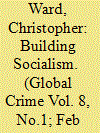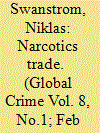|
|
|
Sort Order |
|
|
|
Items / Page
|
|
|
|
|
|
|
| Srl | Item |
| 1 |
ID:
078969


|
|
|
|
|
| Publication |
2007.
|
| Summary/Abstract |
Beginning in 1974, the construction of the Baikal-Amur Mainline Railway (BAM) dominated public life in the Soviet Union for the next decade. Declared complete in 1984, BAM was arguably the greatest and most costly construction feat in post-war Soviet history. Officially, the mainline was to serve as the "path toward communism" that would unite all Soviet citizens. This article explores the crime and corruption that surrounded the propaganda-driven world of the BAM. Although the railway led to few concrete accomplishments in either the industrial or social development of the USSR, the sociological and criminological consequences of BAM were profound. The highly visible presence of both petty and hard-core criminals on the railway revealed that life on the rails was not as progressive or futuristic as the state claimed. Instead, the dynamics of crime and control that intersected during the BAM's ten years of prominence revealed that the peculiarities of human nature, not what the state termed "communist morality," defined those who worked on the project
|
|
|
|
|
|
|
|
|
|
|
|
|
|
|
|
| 2 |
ID:
078966


|
|
|
|
|
| Publication |
2007.
|
| Summary/Abstract |
Traditional definitions of security have tended to concentrate on the state and military threats to its sovereignty. However, in the post-Cold War world, it is clear that a much more nuanced perspective is required, also considering a variety of so-called 'soft' security issues such as social, human and environmental threats. Furthermore, this must appreciate the extent to which these varied threats are integrated. The expanding narcotics trade provides an excellent example of the way global crime creates and facilitates this kind of integrated threat. In both production and transit regions, it generates a variety of interconnected threats to political, economic, human and military security. It thus requires solutions which integrate responses to these various threats and also operate at the local, national, regional and global level.
|
|
|
|
|
|
|
|
|
|
|
|
|
|
|
|
| 3 |
ID:
078967


|
|
|
|
|
| Publication |
2007.
|
| Summary/Abstract |
It is widely accepted that the Tri-Border Area between Argentina, Brazil and Paraguay is a nexus in global terrorist support, and perhaps even operations. However, it is rather more difficult actually to provide evidence of this connection. The region is certainly a smuggling haven, and has substantial populations from the Middle East. Beyond remittances sent to the Middle East - some of which flows to such organisations as Hezbollah - there is little hard evidence available to the academic researcher. Thus the study of this purported crime-terror nexus provides a valuable opportunity for academic researchers to question the assumptions and assertions of policy-makers and pundits, push for transparency of information on the reality of the region and even help understand the problem better
|
|
|
|
|
|
|
|
|
|
|
|
|
|
|
|
| 4 |
ID:
078968


|
|
|
|
|
| Publication |
2007.
|
| Summary/Abstract |
The article focuses on radiological smuggling and its connection with uncontrolled territories, the "grey zones" that have emerged as important conduits for illicit contraband, including the trafficking of radioactive materials. The presence of "grey zones," together with poor border security, weak law enforcement and corruption in government structures, are the most important regional factors that facilitate radiological smuggling. The paper documents the collaboration between criminals, politicians, military and security officers and entrepreneurs in this kind of illicit activity and argues that the fight against radiological smuggling has to shift its focus from technical issues to intelligence gathering and analysis.
|
|
|
|
|
|
|
|
|
|
|
|
|
|
|
|
|
|
|
|
|